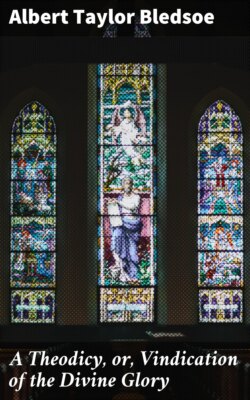Читать книгу A Theodicy, or, Vindication of the Divine Glory - Albert Taylor Bledsoe - Страница 23
На сайте Литреса книга снята с продажи.
The notion of Lord Kames and Sir James Mackintosh on the same subject.
ОглавлениеTable of Contents
Lord Kames boldly cut the knot which philosophy had failed to unravel for him. Supposing the doctrine of necessity to be settled on a clear and firm basis, he resolved our feelings of liberty into “a deceitful sense” which he imagined the Almighty had conferred on man for wise and good purposes. He concluded that if men could see the truth, in regard to the scheme of necessity, without any illusion or mistake, they would relax their exertions in all directions, and passively submit to the all-controlling influences by which they are surrounded. But God, he supposed, out of compassion for us, concealed the truth from our eyes, in order that we might be induced to take care of ourselves, by the pleasant dream that we really have the power to do so.
We shall not stop to pull this scheme to pieces. We shall only remark, that it is a pity the philosopher undertook to counteract the benevolent design of the Deity, and to expose the cheat and delusion by which he intended to govern the world for its benefit. But the author himself, it is but just to add, had the good sense and candour to renounce his own scheme; and hence we need dwell no longer upon it. It remains at the present day only as a striking example of the frightful contortions of the human mind, in its herculean efforts to escape from the dark labyrinth of fate into the clear and open light of nature.
Sir James Mackintosh, though familiar with the speculations of preceding philosophers, was satisfied with none of their solutions of the great problem under consideration, and consequently he has invented one of his own. This solution is founded on his theory of the moral sentiments, which is peculiar to himself. This theory is employed to show how it is, that although we may come by our volitions according to the scheme of necessity, yet we do not perceive the causes by which they are necessarily produced, and consequently imagine that we are free. Thus, the “feeling of liberty,” as he calls it, is resolved into an illusory judgment, and the scheme of necessity is exhibited in all its adamantine strength. “It seems impossible,” [pg 082] says he, “for reason to consider occurrences otherwise than as bound together by the connexion of cause and effect; and in this circumstance consists the strength of the necessitarian system.”56
We shall offer only one remark on this extraordinary hypothesis. If the theory of Sir James were true, it could only show, that although our volitions are necessarily caused, we do not perceive the causes by which they are produced. But this fact has never been denied: it has always been conceded, that we ascertain the existence of efficient causes, excepting the acts of our minds, only by means of the effects they produce. Both Leibnitz and Edwards long ago availed themselves of this undisputed fact, in order to account for the belief which men entertain in regard to their internal freedom. “Thus,” says Edwards, “I find myself possessed of my volitions before I can see the effectual power and efficacy of any cause to produce them, for the power and efficacy of the cause are not seen but by the effect, and this, for aught I know, may make some imagine that volition has no cause.” We shall see hereafter that this is a very false account of the genesis of the common belief, that we possess an internal freedom from necessity; but it is founded on the truth which no one pretends to deny, that external efficient causes can only be seen by their effects, and not by any direct perception of the mind. It was altogether a work of supererogation, then, for Sir James Mackintosh to bring forth his theory of moral sentiments to establish the possibility of a thing which preceding philosophers had admitted to be a fact. It requires no elaborate theory to convince us that a thing might exist without our perceiving it, when it is conceded on all sides, that even if it did exist, we have no power by which to perceive it. With this single remark, we shall dismiss a scheme which resolves our conviction of internal liberty into a mere illusion, and which, however pure may have been the intentions of the author, really saps the foundation of moral obligation, and destroys the nature of virtue.
[pg 083]
